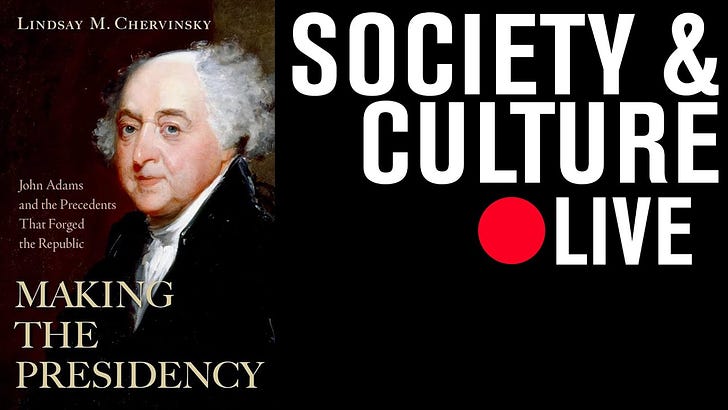How John Adams’ words and deeds helped define the presidency
And some spooktacular tales about the U.S. Capitol
This week I chatted with Dr. Lindsay Chervinsky about her latest book, Making the Presidency: John Adams and the Precedents That Forged the Republic (Oxford University Press). It ws a very interesting conversation.
By “precedents” she was not referring to court decisions—no, she means actions and choices that added clarifty to what the presidency was and how it worked. One the book cites is the authority for a chief executive to remove an apppointee.
Another is the norm of a peaceable transfer of power from one administration to another. As Dr. Chervinsky noted in our conversation, John Adams lost reelection, but he did not tell the public he was robbed or join the various schemes to keep him or his party in office.
I hope you will watch the conversation and buy the book!
Spooktacular: The Haunted History of the U.S. Capitol
The United States Capitol Historical Society has some ghost stories for you. Enjoy!
ICYMI: Elections Potpourri!
Sasha Isenberg, “When a Trailblazing Suffragist and a Crusading Prosecutor Teamed Up to Expose an Election Conspiracy,” Smithsonian magazine.
“Stimson believed the parallel crusades for temperance and women’s suffrage would remove power from the saloons and restore it to the family home. And she viewed Roberts as a pawn of this saloon culture, which was making Terre Haute “the hellhole of Indiana,” as one East Coast newspaper described it.”
Edward Foley, “Why Majority-Preferred Candidates Should Win Single-Seat Elections,” Common Ground Democracy Substack.
“Simply electing the candidate with the most votes isn’t enough, because the most votes—a plurality—isn’t necessarily a majority, which must be more than 50%. If there are three or more candidates in contention, then votes might be split among them in such a way that none receives a majority. Ideally, an electoral procedure would ascertain and put into office the candidate whom a majority of voters prefer to each alternative.”
Mark Stricherz, “The Conservative Senator Trump Hates,” Washington Examiner.
“It’s tempting to think Cassidy benefited from another favorable political circumstance. For decades, Louisiana operated a “jungle primary” in which the two top finishers faced each other in a runoff race unless one candidate racked up more than 50% of the vote. All registered voters, regardless of political affiliation, are eligible to vote. That reduces the power of ideologically minded voters in both parties, including Trump die-hards. Yet that system will be gone. Earlier this year, Louisiana abolished its jungle primary in favor of a “closed primary” for certain offices, including Congress, a system that gives partisan die-hards like Trump’s larger sway.”




Thanks. I was unaware that Louisiana had changed its electoral system for some offices. That's quite a break with their history, and certainly counter to the recent trends in some places towards Ranked-Choice Voting.